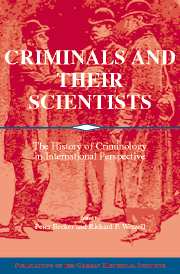Book contents
- Frontmatter
- Introduction
- Part One Nonacademic sites of Nineteenth-Century Criminological Discourse
- Part Two Criminology as Scientific and Political Practice in the Late Nineteenth and Early Twentieth Centuries
- Part Three The Making of the Criminologist
- 13 The International Congresses of Criminal Anthropology: Shaping the French and International Criminological Movement, 1886-1914
- 14 Making Criminologists: Tools, Techniques, and the Production of Scientific Authority
- 15 “One of the Strangest Relics of a Former State”: Tattoos and the Discourses of Criminality in Europe, 1880-1920
- 16 What Criminals Think about Criminology: French Criminals and Criminological Knowledge at the End of the Nineteenth Century
- 17 Talk of the Town: The Murder of Lucie Berlin and the Production of Local Knowledge
- Part Four Criminology in the First Half of the Twentieth Century: The Case of Weimar and Nazi Germany
- Index
16 - What Criminals Think about Criminology: French Criminals and Criminological Knowledge at the End of the Nineteenth Century
Published online by Cambridge University Press: 05 January 2013
- Frontmatter
- Introduction
- Part One Nonacademic sites of Nineteenth-Century Criminological Discourse
- Part Two Criminology as Scientific and Political Practice in the Late Nineteenth and Early Twentieth Centuries
- Part Three The Making of the Criminologist
- 13 The International Congresses of Criminal Anthropology: Shaping the French and International Criminological Movement, 1886-1914
- 14 Making Criminologists: Tools, Techniques, and the Production of Scientific Authority
- 15 “One of the Strangest Relics of a Former State”: Tattoos and the Discourses of Criminality in Europe, 1880-1920
- 16 What Criminals Think about Criminology: French Criminals and Criminological Knowledge at the End of the Nineteenth Century
- 17 Talk of the Town: The Murder of Lucie Berlin and the Production of Local Knowledge
- Part Four Criminology in the First Half of the Twentieth Century: The Case of Weimar and Nazi Germany
- Index
Summary
For the past thirty years, historians of criminology have extensively studied the birth and development of criminology - from phrenology to criminal anthropology - and have reviewed the different debates about the criminal's personality that engaged the scientific community in the late nineteenth century. More recently, these historians have taken an interest in the impact of criminology outside the scientific community. As a consequence, there have been studies to determine how the judicial system assessed and used this new knowledge. Other historians have studied contemporary literature to find evidence of the spread of this specific knowledge, especially among naturalistic writers. The press also has been the subject of some research, and it appears that tabloids tended to popularize criminology when reporting on famous criminal trials.
But what about those most intimately involved, namely, the criminals themselves? No one has tried to find out how they reacted to this scientific knowledge. Perhaps it has been assumed that they could not understand what was said about them, as if criminology was a science similar to botany or as if the discourse was irrelevant. Yet, just as a history of medicine is not complete if it does not include the point of view of those who benefit from it, so too the history of criminology and psychiatry must reckon with the way criminals and insane people have reacted to this discourse, have used it, and have lived with it. I am convinced that we must attempt to write their story. Therefore, I plead for research that does not regard criminology exclusively as an activity of the scientific community but studies it in interaction with its subjects, the criminals.
- Type
- Chapter
- Information
- Criminals and their ScientistsThe History of Criminology in International Perspective, pp. 363 - 376Publisher: Cambridge University PressPrint publication year: 2006
- 1
- Cited by

